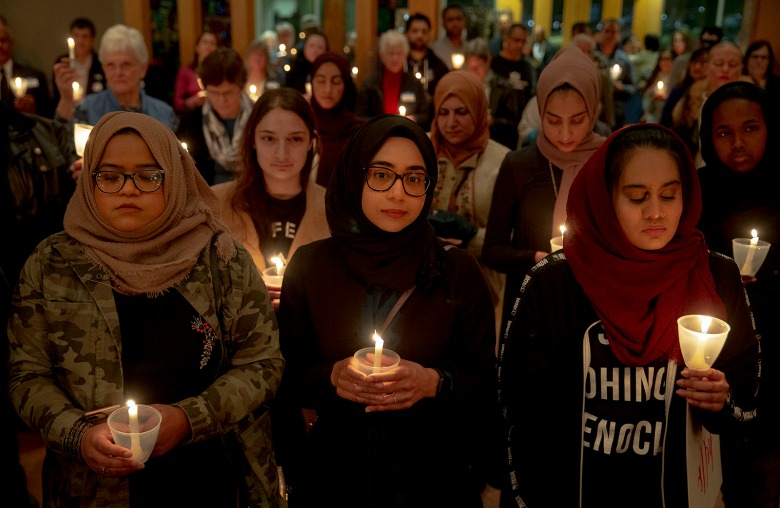
(Nick Wagner/American-Statesman/Associated Press) A service was held in Austin, Texas, in honor of those killed and injured in the terror attack at two mosques in Christchurch, New Zealand.
Since last week’s horrific massacre at two mosques in Christchurch, New Zealand, much has been written about the global expansion of race- and religion-based hate. President Trump’s three tweets of “warmest sympathy and best wishes” to New Zealand rang utterly hollow, interspersed as they were amid more than 50 tweets he sent between Friday morning and Sunday evening that included multiple retweets of himself on television, warnings about the “Jexodus” of Jews from the Democratic Party, still more criticisms of deceased Republican Senator John McCain, and conspiracy theories spread by “Pizzagate” enthusiast Jack Posobiec. He also tweeted defenses of Fox personalities Tucker Carlson and Jeanine Pirro with an abhorrently ill-timed rallying cry, “Be strong & prosper, be weak & die!” This is a man whose presidential campaign trafficked relentlessly in anti-Muslim rhetoric buttressed by fear-mongering lies, like his pronouncement that “Islam hates us.” When, two days after the mosque attacks, acting White House Chief of Staff Mick Mulvaney said hotly on national television, “The President is not a white supremacist; I’m not sure how many times we have to say that,” it was an insult to the intelligence of the human species, or at least those humans who have been paying even the slightest bit of attention.
At Religion & Politics, we have repeatedly pointed out that white supremacist and anti-Muslim ideologies are being energized by the speech and actions of Trump, along with the highest levels of his administration. It is not simply that Trump is hateful or seems worrisomely unwell, as many commentators have pointed out; it’s that the form of hatred he emboldens is deadly. As we’ve done after racist murders of black men and women in countless communities, the neo-Nazi marches in Charlottesville, the anti-Semitic killings at Pittsburgh’s Tree of Life Synagogue, and more, we condemn the actions of the latest white supremacist assassin and those who are complicit in the spreading of his xenophobic worldview. It becomes clearer by the day that to be negligent in calling out racist and anti-religious bigotry is its own form of complicity, one for which there are enormously high costs. Racism, white supremacist ideology, and anti-Muslim animus corrode us and our world from within and without; they are lethal. I’m not sure how many times we have to say that.
In these times, we at R&P stand with Muslims across the nation and the world who rightly fear for their safety and that of their children. We mourn the 50 lives most recently taken by hate, deaths that sources are still tabulating but currently include a devastating range of people, from 3-year-old Mucad Ibrahim to 14-year-old Sayyad Milne, up to 47-year-old Husna Ahmad, and 78-year-old Abdukadir Elmi. Dozens more were injured and will live with the after-effects of this traumatic experience for the rest of their lives. The names and the stories of all these victims and survivors matter, and they must be remembered. If only they were the last.
But copycat killings are sure to be attempted, as they always are—the Christchurch murderer himself was inspired by the Norwegian anti-Muslim and misogynistic terrorist Anders Breivik—and some will doubtless succeed. Conspiracy addicts working for right-wing media outlets will continue to downplay the criticism that through their histrionic caricatures of political figures like Ilhan Omar, and their unremitting claims that Muslim communities such as Islamberg, New York, are terrorist training camps, they are spreading unfounded fears that stoke horrific acts of violence. And so they will continue to disseminate deadly combinations of general outrage and specific targets. Observers who deplore the violence will perhaps do small but important things, like donate money to fundraising efforts for the victims’ families or vow to help Muslims in their local communities feel safe. We’ve done it before; we’ll do it again. Having been through things like this so many times before, many despair that anything will change.
Pursuing big goals, however, is a marathon, not a sprint; and there will be no finish line in the race to end hate in the world. If the long history of clashes, collusions, and other interactions between religion and politics teaches us anything, it’s that. Once more, we grieve; once more, we resolve to do what we can—all that we can—to quell the fires of racism, anti-Semitism, and anti-Muslim bigotry that burn ferociously today.
Marie Griffith is the director of the John C. Danforth Center on Religion and Politics and the editor of Religion & Politics. Her latest book is Moral Combat: How Sex Divided American Christians and Fractured American Politics. Follow her @RMarieGriffith.